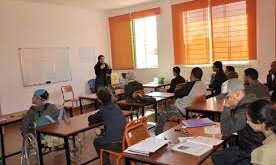The relationship between the PLO and the Palestinian National Authority
Dr. Osama Darraj
Assistant Professor of Constitutional Law –
Al- Istiqlal University
Jericho – Palestine
Summary
Despite the organization’s insistence on alerting the authority to it legally and politically, the authority operated independently of the organization, and took many of its powers, and this is reflected in the overlapping of powers between the central and national councils with the Legislative Council, and this overlap led to a decline in the role of the organization and its national program that it represents the national interests of the Palestinian people everywhere. This requires the reactivation of the institutions of the Palestine Liberation Organization, especially the political circle of the organization, whose powers have shrunk to the benefit of the Ministry of Foreign Affairs of the Authority and the complete separation between membership in the institutions of the Authority and institutions affiliated with the Palestine Liberation Organization because the Palestinian people is still under occupation and in the stage of national liberation.
an introduction
The Palestine Liberation Organization is the body that represents the Palestinian people in all its places, in the homeland and the Diaspora, and it is a person of public international law and is recognized internationally as the legitimate and sole representative of the Palestinian people wherever it exists and it represents it in international forums, and the organization has an organizational structure similar to the organization of states in terms of the three authorities were established in Jerusalem after the Arab-Palestinian Conference in 1964 and the basic structure of the organization depends on three main constitutional documents, namely, the basic system of the Liberation Organization, the national charter, and the independence document [1] , along with many other documents and legislation related to financial and administrative aspects. The Palestinian liberation organization did not present an exclusive constitutional document regarded as a constitution as it is found in most of the political systems. [2] As for the Palestinian National Authority, the amended Palestinian Basic Law of 2003 considers the constitutional framework governing them. With the establishment of the Palestinian National Authority in the West Bank and Gaza Strip in 1994, the relationship between them and M Liberation Organization interference, which led to the increased influence of authority over the organization’s account.
The problem of the study:
Since the establishment of the Palestinian National Authority in the year 1993, according to an agreement, many overlaps appeared in the powers between this authority and the Palestine Liberation Organization, and the legal problems increased between them after the National Authority took control and its role increased at the expense of the organization.
Study questions:
This study aims to answer a set of questions, namely:
What is the constitutional organization that governs the Palestine Liberation Organization?
What is the constitutional organization that governs the Palestinian National Authority?
To what extent was the constitutional documents of the Palestinian National Authority affected by the Palestine Liberation Organization?
This study will answer the main question, where is the overlap between the Palestine Liberation Organization and the Palestinian National Authority?
Study methodology:
In this study, the researcher relied on the analytical method, as part of his analysis of the legislative texts governing both the PLO and the Palestinian National Authority.
the importance of studying:
The importance of this study stems from its subject matter, which is the existence of overlapping competencies between two entities that govern each constitutional document independent of the other, thus highlighting these documents in the interest of legitimacy and the rule of law.
Objectives of the study :
This study aims to shed light on the overlap of competencies between the Palestinian National Authority and the Palestine Liberation Organization to correct the legal situation by the competent authorities to prevent interference and continuation of the existing legal problems.
Study plan:
The first requirement: overlapping powers between the PLO and the Palestinian National Authority
The second requirement: The Basic Law of the National Authority was affected by the constitutional documents of the PLO.
The first requirement: overlapping powers between the PLO and the Palestinian National Authority
After the formation of the National Authority and its announcement in the year 1993 after the signing of the Oslo agreement between the PLO[3] and Israel, hence the crisis between the Authority and the PLO, which is the largest incubator and from which the National Authority emerged, but in reality the National Authority turned into the largest incubator and decision-maker and replaced the PLO The Palestinian government held the reins of affairs, and the crisis and duplication appeared in the relationship between them[4], and it is a manifestation of the overlapping relationship and powers between the PLO and the Palestinian National Authority:
First: The merger between the position of President of the National Authority and that of the Chairman of the Executive Committee of the PLO
And this is at the level of overlap in the executive authority, as stated in Article 35 of the amended Palestinian Basic Law of 2003, which states that (before the start of his duties, the president takes the following oath before the Legislative Council in the presence of the Speaker of the National Council ……).
Second: The Judicial Authority
The authority worked to include the Revolutionary Judicial Authority of the Liberation Organization under its umbrella and replaced its name so that it became known as the Military Judicial Authority[5] and was reconstituted in 2018 under the name of the Security Forces Judicial Authority under Article 2 of Resolution No. (2) of 2018 regarding the Judicial Authority of the Security Forces.
Where the Security Forces Judicial Council is formed by a decision of the Supreme Commander, as follows: a. Head of the Security Forces Judiciary as president. B. Deputy Head of the Security Forces Judiciary Deputy. C. Military Attorney General as member. Dr.. Presidents of the courts of appeal are a member. H. The President of the Special Court is a member. And. The head of the Judicial Inspection Department is a member. 2. In addition to the powers mentioned in this law decree, the council is responsible for preparing the plans, mechanisms, structures and budgets necessary to develop and enhance the work of the commission and its judicial and administrative staff. 3. The Council shall assume its powers and competencies in accordance with a system issued by the Council of Ministers upon the recommendation of the Chairman of the Commission.
Third: External representation
There is an overlap in the terms of reference between the political department of the PLO and the Ministry of Foreign Affairs of the National Authority, as stated in Article 40 of the Palestinian Basic Law that (the President of the National Authority appoints representatives of the National Authority to states and international organizations and foreign bodies and ends their duties, as representatives of these bodies depend with the authority Palestinian nationalism) and in the same direction stated in Article 13 of the Diplomatic Corps Law No. 13 of 2005 that (Palestinian missions are created or closed by a decision of the President upon the recommendation of the Minister) and the Minister here is the Minister of Foreign Affairs of the National Authority as stipulated in Article 7 poverty (A) of this law that (to be appointed ambassador and name it and move it and return it to the headquarters of the decision of the President, upon the recommendation of the Minister).
In the preamble of the diplomatic corps law, an explicit reference to the Palestine Liberation Organization, especially the political circle, was mentioned, indicating that this law does not constitute a derogation or prejudice to the Palestine Liberation Organization as the legitimate and sole representative of the Palestinian people, and it is the authority of authority as stated in the Palestinian Basic Law, however this is The contradiction is clear between the Palestinian Basic Law and the diplomatic corps law on the one hand and the powers of the Executive Committee and its various departments, especially the political circle, according to the articles of association of the Palestine Liberation Organization, which gives the organization alone the power to conclude treaties International and diplomatic representation in states and international organizations, as they have legal personality at the level of public international law[6].
Fourth: At the level of internal legislation
There are many legislations issued by the Legislative Council that regulate the status of PLO employees as is the case in the Service Law in Security Forces No. 8 of 2005, which subjugates the PLA forces as security forces affiliated with the PLO to its provisions.
Likewise, the Palestinian Security Forces Insurance and Pensions Law No. 16 of 2004 considered this law the civil and military staff of the PLO who worked in the Palestine Liberation Army from the categories subject to its provisions, and the retirement law of No. 7 of 2005 subjected the employees of the PLO to its provisions, as is clear from the text of Article 7 Paragraph B, which stipulates that (the PLO employees who assume responsibilities abroad, and whose salaries are paid from the public budget, provided that they do not participate in other government pension systems) there is overlap in this aspect. Article 3 of the diplomatic corps law No. 13 of 2005 mentioned the tasks of the Ministry of Foreign Affairs, namely: 3. Supervising all missions politically, administratively and financially, including appointments and transfers in accordance with the law 4. Developing and developing international cooperation with Palestine and representing Palestine with external parties. 5. Caring for the interests of the Palestinians abroad, strengthening the relationship with them and deepening their communication with their people and their homeland. 6. Approving the diplomatic passport in accordance with a system issued by the Council of Ministers.) While Article 7, paragraph 1 of the PLO offices system gave the organization’s offices the authority to represent it and supervise the conditions of Palestinians residing in the countries in which they are present, this system gave the authority to external representation of the PLO offices In all its places.
Fifth: Transfer the reference of many institutions
There are many institutions that were originally affiliated with the Council of Ministers of the Palestinian National Authority to the Liberation Organization, or to the President of the Palestinian National Authority, such as the Radio and Television Authority of the Palestinian News and Information Agency, where it became, according to Presidential Decree No. 6 of 2011, one of the institutions of the PLO and subordinate to the President after It was originally subordinate to the Council of Ministers, and the management of the crossings for its responsibility through presidential decrees issued by the President of the Palestinian National Authority, who is the President of the Palestine Liberation Organization[7].
Sixth: Overlapping positions
In accordance with the provisions of Article 4, paragraph 6 of Resolution No. 1 of 2007 regarding general elections, members of the Legislative Council who are elected during their term of office will be members of the Palestinian National Council as soon as they perform the legal oath in accordance with the provisions of the articles of association of the Palestine Liberation Organization.
The heads of the committees and the heads of the parliamentary blocs in the Legislative Council are members of the Central Council of the Liberation Organization, as this council is considered a permanent body emanating from the Palestinian National Council, and it is accountable to it and is formed from among its members[8] .
In addition to the above, many senior personalities have combined several positions and responsibilities of both the authority and the organization, there are those who combine membership of the National and Central Council and the Executive Committee of the Liberation Organization in addition to membership of the Legislative Council and the Council of Ministers in the Palestinian National Authority[9] .
It was free for the Palestinian legislator to separate between the PLO and the Palestinian National Authority an organic chapter so that members of the constitutional institutions of the Palestine Liberation Organization devote themselves to managing the crucial issues of the Palestinian people who are still under occupation, leaving administrative matters and internal issues to new members in accordance with the provisions of the Palestinian Basic Law and lack of duplication in Positions, because of its respect for the principle of separation of powers and enhances oversight and transparency among them.
The second requirement: The Basic Law of the National Authority was affected by the constitutional documents of the PLO
The amended Basic Law of 2003 was affected by the constitutional documents of the Liberation Organization and these documents are represented in the basic system of the Palestine Liberation Organization in 1964[10] and the Palestinian National Charter in 1964 and the Declaration of Independence document in 1988. The amended Palestinian Basic Law in 2003 is a constitution for the Palestinian National Authority, and was affected when it issued the documents Constitutional organization of the PLO, which was the constitutional reference for the PLO before the promulgation of the Basic Law. Some forms of this influence include:
First: Defining Palestine and the Arab affiliation of the Palestinian people
What is stated in Article 1 of the Palestinian Basic Law amending 2003 is the definition of Palestine as part of the Arab world (Palestine is part of the great Arab nation, the Palestinian Arab people is part of the Arab nation and Arab unity is a goal that the Palestinian people work towards achieving) (it was affected by Article 1 of the Charter The Palestinian National for the year 1964, which stated that (Palestine is the homeland of the Palestinian Arab people, and it is an integral part of the great Arab homeland, and the Palestinian people are part of the Arab nation)[11] .
Second: the form of government
The amended Palestinian Basic Law of 2003, in Article 5, adopted the system of representative government, stipulating that (the system of government in Palestine is a representative democratic system based on political and party pluralism ………). This is consistent with what was stated in the document of the Declaration of Independence of 1988 that the system of government is (a parliamentary democracy based on freedom of opinion, freedom to form parties, care for the majority, minority rights, and respect for minority decisions by the majority).
The parliamentary democratic system[12], according to what is relied upon in the constitutional systems, is based on the existence of an elected council for a specified period of four years, and it has effective powers and the representative represents the people as a whole.
Third: Public rights and freedoms
We find that the amended Palestinian Basic Law of 2003 was affected in the section on rights and freedoms in the Declaration of Independence document for 1988, and we find that all of the rights and public freedoms mentioned in the document of the Declaration of Independence for the year 1988 have been adopted by the Palestinian legislator amending the Basic Law of 2003 in an organized manner in Chapter Two related to rights and freedoms General of this law.
It is clear from the previous presentation, the extent of overlap between the organization and the authority in many areas, and this requires activating the role of the PLO and its institutions as the largest incubator for the authority and issuing the necessary legislations to determine the relationship of the PLO to the authority to remove the contradiction and duplication of powers and tasks and not weighting the authority at the expense of the PLO, Because the Palestinian people are still in the stage of national liberation.
Conclusion
It is clear from the foregoing that there is an overlap of the relationship between the PLO and the Palestinian National Authority in the multiplicity of institutions and the similarities of competencies and grouping in positions without a clear legal organization that defines this relationship and separates between institutions affiliated with the PLO and the National Authority and from this conflict of competence and powers has arisen and this is evident in the combination of Membership of the National and Central Councils and the Executive Committee of the Palestine Liberation Organization, and the membership of the Legislative Council in the Palestinian National Authority and hence all legislation should be amended to prevent this overlap in terms of reference and the organic and functional separation between the Authority and Organization.
Results:
This study reached several results:
1- The Palestinian Basic Law constitutes the legal framework for the Palestinian National Authority, while the basic system of the PLO in 1964 constitutes the legal framework for the PLO.
2- The constitutional documents of the Palestine Liberation Organization and the National Authority did not prevent duplication of membership in institutions affiliated with the Authority and the organization.
3- The powers of the Legislative Council as an institution of the National Authority extended to the affairs of the Palestine Liberation Organization, its institutions and its cadres, and approved some administrative and financial rights for them within the institutions of the National Authority.
4- Legislations issued by the Legislative Council and the Palestinian President have contributed to increasing overlap between institutions affiliated with both the organization and the Authority.
5- Transferring the dependency of many institutions affiliated with the PLO to the authority, which loses its role in representing the Palestinian people abroad.
Recommendations:
This study reached several recommendations.
1- Complete separation between membership in the Palestinian Authority and institutions of the Palestine Liberation Organization.
2- Activating the role of the National or Central Council by legislating the institutions of the Liberation Organization in all its organizational, financial and administrative matters.
3- Subjecting all financial matters to the employees of the Palestine Liberation Organization to the Palestinian National Fund affiliated to the organization, which reduces the burden on the budget of the Authority.
4- The reactivation of the institutions of the Palestine Liberation Organization, especially the political circle of the organization, whose powers have shrunk to the authority of the Authority’s Ministry of Foreign Affairs.
5- Maintaining the revolutionary judiciary as a constitutional institution of the PLO, and de-merging it with the security forces judiciary.
[1] Moeen Al-Barghouthi and Rashad Tawam, the legal system of the Palestine Liberation Organization, legislation governing security and revolutionary justice. Institute of Law, Birzeit University 2010, p. 34 and beyond.
[2] Asim Khalil and Rashad Tawam, Palestine between the state constitution and the need for a national pact, publications of the Palestinian Center for Research, Policy and Strategic Studies, Masarat, Ramallah 2014, p. 30
[3] On the genesis of the Palestine Liberation Organization, see Moein Barghouti and Rashad Tawam, op. Cit., P. 7 onwards
[4] For more, review Mamdouh Nofal, the problem of the relationship between the Palestinian Authority and the PLO, and ways to solve it, Journal of Palestinian Studies, Volume 6, No. 22, Spring 1995, p. 52
[5] The Military Judicial Authority was established by Decree No. (19) of 1994, which stipulated the establishment of a military judiciary for the Palestinian National Authority operating in the penal legislation of the Palestine Liberation Organization. With this decree, the revolutionary judiciary merged with the military judiciary and the Military Judicial Authority was established.
[6] Assem Khalil, Studies in Palestinian Constitutional Law, Faculty of Law and Public Administration, Birzeit University, third edition 2014, p. 28
[7] Ahmad Abu Dayyeh and Jihad Harb, Report on “Balanced Separation of Powers in the Palestinian Political System” Executive Authority: The Presidency Foundation, Muwatin Foundation – The Palestinian Institute for the Study of Democracy, 2006, p. 12.
[8] The Palestinian Central Council website http://www.palestinepnc.org
[9] Moeen Al-Barghouthi and Rashad Tawam, previous reference, p. 34.
[10] To view the Palestinian National Charter on the following website: Palestinian Encyclopedia https://www.palestinapedia.net/
[11]The Declaration of Independence document is a declaration made on November 15, 1988. In Algeria, the 19th session of the Palestinian National Council, to view the document at the following link: http://info.wafa.ps/.
[12] For more on the parliamentary system, review Noman Al-Khatib, the mediator in political systems and constitutional law, Darat Al-Thaqafa, Oman 2020, p. 219, and beyond.
 مجلة المنارة مجلة المنارة للدراسات القانونية والإدارية
مجلة المنارة مجلة المنارة للدراسات القانونية والإدارية




